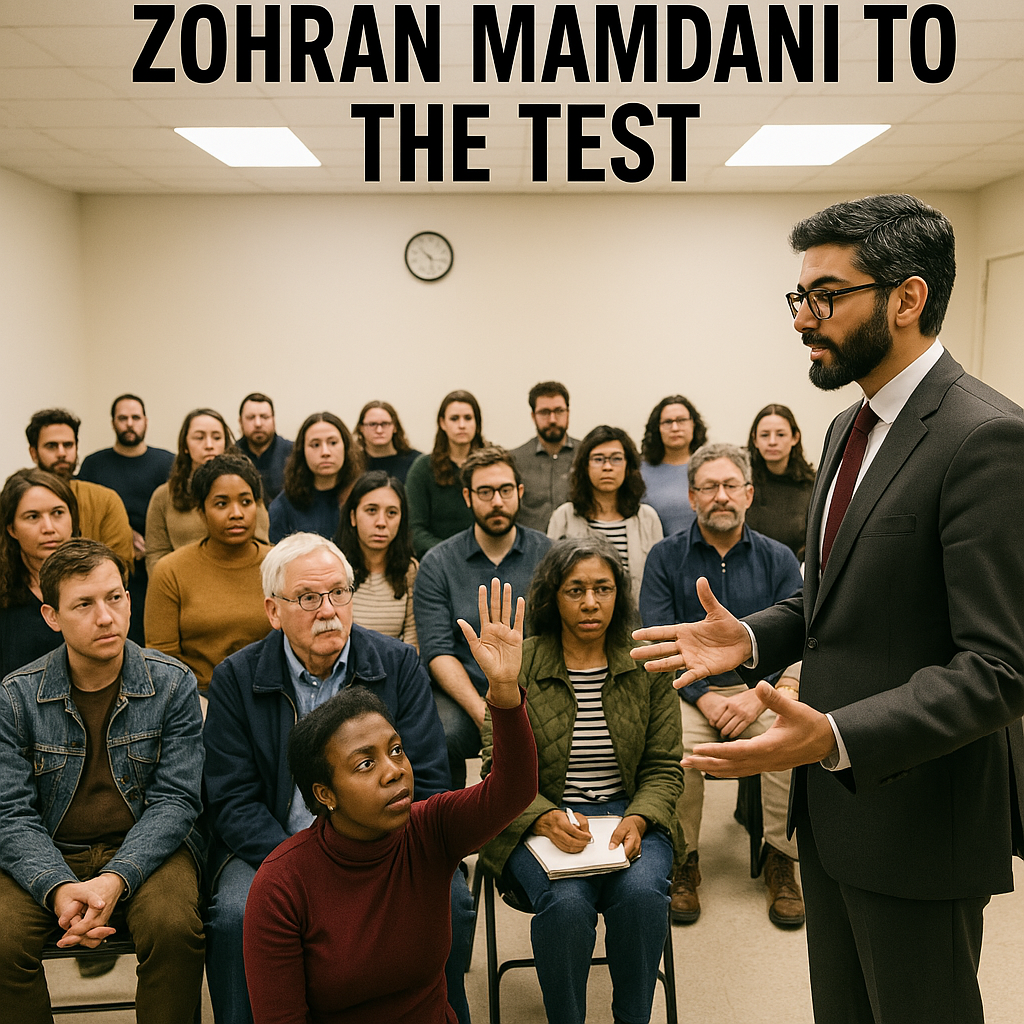In the heart of New York City, where diversity and determination converge, a new political storm is brewing. Zohran Mamdani, a progressive state assemblyman known for his outspoken views on housing, social justice, and economic equity, has announced his candidacy for mayor. But in a city where every resident has an opinion and expectations run high, Mamdani’s campaign took a unique turn when he agreed to be directly questioned by a handpicked group of 18 New Yorkers.
These individuals, chosen to reflect the city’s wide-ranging demographics, occupations, and political beliefs, came together in a no-holds-barred town hall-style event that tested Mamdani’s policies, patience, and political prowess. From Bronx youth activists to Staten Island police officers, Wall Street professionals to Harlem educators, the evening was designed to reveal whether Mamdani could truly be the leader of “all New Yorkers.”
Setting the Stage
The event was held at the Brooklyn Museum—a symbolic venue, historically known for hosting conversations around art, identity, and civic engagement. The atmosphere was electric with anticipation as cameras rolled, pens scribbled, and voices murmured. The 18 participants were seated in a semi-circle around Mamdani, who took the center stage with calm composure.
The ground rules were simple: each participant would have five minutes to question Mamdani on any issue. He was not prepped in advance, and no topics were off-limits.
The Questions Begin
First up was Rosa Jimenez, a public school teacher from Queens. “You talk a lot about equitable education funding, but our schools are still under-resourced. How exactly will you fix this when mayors before you have all failed?” she challenged.
Mamdani responded with a call for a reallocation of city resources and a wealth tax on the ultra-rich to boost education funding. He emphasized transparency and community-driven budgeting as core strategies.
Next came Thomas Burke, a retired NYPD officer from Staten Island. “How do you plan to balance your calls for police reform with keeping crime down in high-risk areas?”
“We must redefine public safety,” Mamdani said, citing successful pilot programs that redirect certain emergency calls to mental health professionals and community organizations. He also stressed investment in community centers and youth employment programs as a means to address crime at its root.
Economic Equity and Housing
Lena Wu, a software engineer from Manhattan, pressed him on economic opportunity. “Many of us are struggling with rent, yet we make too much to qualify for assistance. What are your plans for the middle class?”
Mamdani advocated for universal rent control and a city-run housing initiative to develop affordable units for both low and middle-income residents. He proposed a “Right to Remain” act, which would give tenants greater protection from sudden rent hikes and evictions.
Harlem-based community organizer Malik Thompson challenged Mamdani on gentrification: “How will you protect communities of color from being pushed out by development?”
Mamdani committed to community land trusts, curbing rezoning that favors luxury developments, and introducing anti-displacement measures that prioritize long-term residents.
Climate and Infrastructure
An environmental science student, Dana Al-Khatib from the Bronx, asked about Mamdani’s green policies. “What will you do to make NYC more climate-resilient?”
He outlined a Green New Deal for New York City, which includes retrofitting public buildings for energy efficiency, expanding green spaces, and investing in climate-resilient infrastructure in flood-prone neighborhoods.
Tensions and Turning Points
Halfway through, the atmosphere grew tense. A small business owner from Brooklyn, Ravi Patel, questioned Mamdani’s economic policies. “Your tax plans sound great, but what about small businesses already drowning in regulation and post-pandemic debt?”
Mamdani acknowledged the issue and pledged to streamline city bureaucracy, offer tax credits to small businesses that hire locally, and create public banks to provide low-interest loans.
But not every exchange ended smoothly. When conservative activist Sarah Klein accused Mamdani of being “anti-police and anti-business,” the crowd stirred. Mamdani held his ground. “Criticizing institutions is not hatred. It’s a call for betterment.”
Hope and Skepticism
By the end of the night, some participants looked inspired, while others remained cautious. Several admitted they came in skeptical but left intrigued. “He listens,” said Michael Rodriguez, a Bronx youth mentor. “That doesn’t mean I agree with everything, but it’s rare.”
Emily Chen, a nurse from Brooklyn, commented, “He didn’t dodge. He took the hits and responded with substance. That’s more than I can say for most politicians.”
Yet others were unconvinced. “He talks a good game, but can he deliver? That’s the question,” muttered one Wall Street attendee.
The Verdict
Mamdani, whether loved or criticized, proved he is not afraid of tough questions. In a city where politics often feel scripted and disconnected, this event was a breath of fresh air. His answers showcased a bold vision, a nuanced understanding of policy, and a willingness to engage with dissenting voices.
As the event wrapped, Mamdani addressed the group: “This wasn’t a performance. It was a promise—that I’ll always be accountable to you. Not just now, but every day I seek to serve.”
Only time will tell if the people of New York believe in that promise. But one thing is certain: the race just got a lot more interesting.
